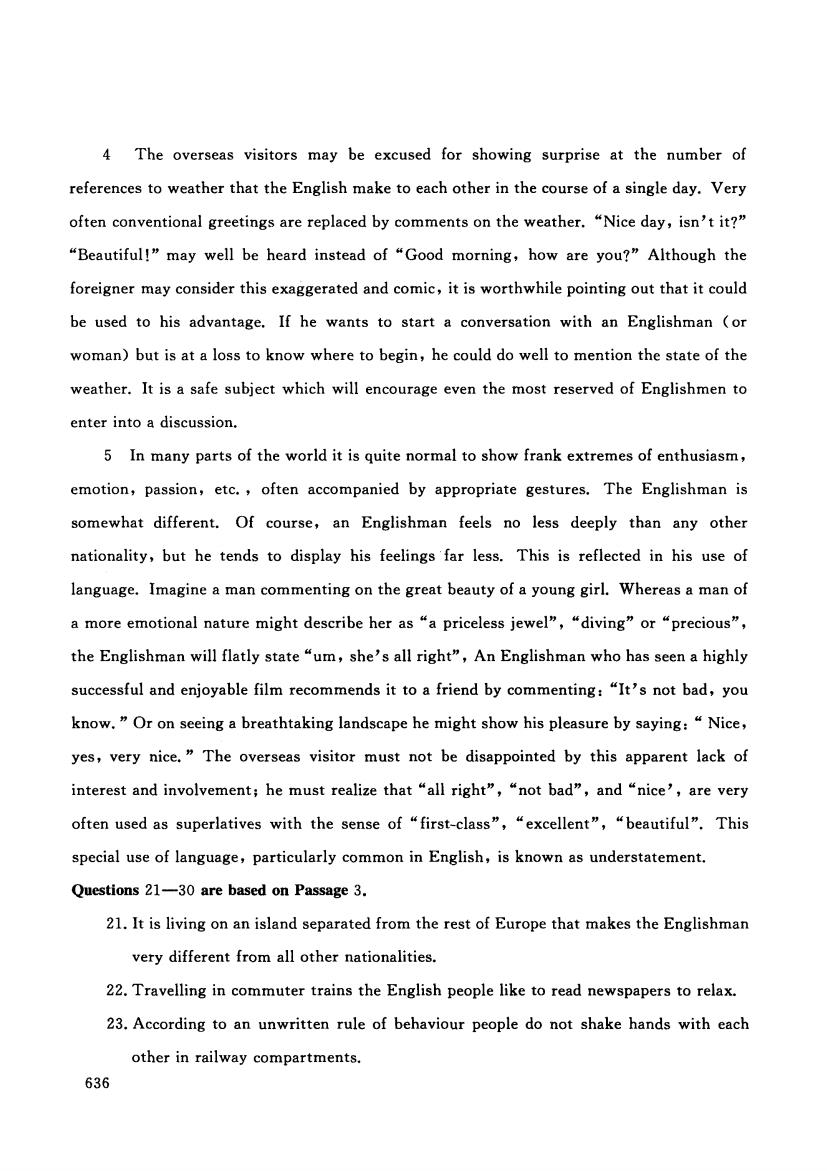正在加载图片...

4 The overseas visitors may be excused for showing surprise at the number of references to weather that the English make to each other in the course of a single day.Very often conventional greetings are replaced by comments on the weather."Nice day,isn't it?" “Beautiful!”may well be heard instead of“Good morning,how are you?”Although the foreigner may consider this exaggerated and comic,it is worthwhile pointing out that it could be used to his advantage.If he wants to start a conversation with an Englishman (or woman)but is at a loss to know where to begin,he could do well to mention the state of the weather.It is a safe subject which will encourage even the most reserved of Englishmen to enter into a discussion. 5 In many parts of the world it is quite normal to show frank extremes of enthusiasm, emotion,passion,etc.,often accompanied by appropriate gestures.The Englishman is somewhat different.Of course,an Englishman feels no less deeply than any other nationality,but he tends to display his feelings far less.This is reflected in his use of language.Imagine a man commenting on the great beauty of a young girl.Whereas a man of a more emotional nature might describe her as“a priceless jewel”,“diving”or“precious'”, the Englishman will flatly state "um,she's all right",An Englishman who has seen a highly successful and enjoyable film recommends it to a friend by commenting:"It's not bad,you know.Or on seeing a breathtaking landscape he might show his pleasure by saying:"Nice, yes,very nice.The overseas visitor must not be disappointed by this apparent lack of interest and involvement;he must realize that“all right'”,“not bad”,and“nice',are very often used as superlatives with the sense of“first--class"”,“excellent'”,“beautiful”.This special use of language,particularly common in English,is known as understatement. Questions 21-30 are based on Passage 3. 21.It is living on an island separated from the rest of Europe that makes the Englishman very different from all other nationalities. 22.Travelling in commuter trains the English people like to read newspapers to relax. 23.According to an unwritten rule of behaviour people do not shake hands with each other in railway compartments. 6364 The overseas visitors may be excused for showing surprise at the number of references to weather that the English make to each other in the course of a single day. Very often conventional greetings are replaced by comments on the weather. "Nice day , isn' t it?" "Beautiful!" may well be heard instead of "Good morning , how are you?" Although the foreigner may consider this exaggerated and comic , it is worthwhile pointing out that it could be used to his advantage. If he wants to start a conversation with an Englishman (or woman) but is at a loss to know where to begin , he could do well to mention the state of the weather. It is a safe subject which will encourage even the most reserved of Englishmen to enter into a discussion. 5 In many parts of the world it is quite normal to show frank extremes of enthusiasm , emotion , passion , etc. , often accompanied by appropriate gestures. The Englishman is somewhat different. Of course , an Englishman feels no less deeply than any other nationality , but he tends to display his feelings far less. This is reflected in his use of language. lmagine a man commenting on the great beauty of a young girl. Whereas a man of a more emotional nature might describe her as "a priceless jewel" , "diving" or "precious" , the Englishman will flatly state "um, she' s all right" , An Englishman who has seen a highly successful and enjoyable film recommends it to a friend by commenting: "It' s not bad , you know. " Or on seeing a breathtaking landscape he might show his pleasure by saying: " Nice , yes, very nice." The overseas visitor must not be disappointed by this apparent lack of interest and involvement; he must realize that "all right" , "not bad" , and "nice' , are very often used as superlatives with the sense of "first-class" , "excellent" , "beautiful". This special use of language , particularly common in English , is known as understatement. Qu tioos 21-30 are based 00 Passage 3. 21. It is living on an island separated from the rest of Europe that makes the Englishman very different from all other nationalities. 22. Travelling in commuter trains the English people like to read newspapers to relax. 23. According to an unwritten rule of behaviour people do not shake hands with each other in railway compartments. 636